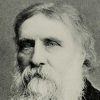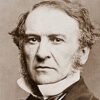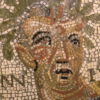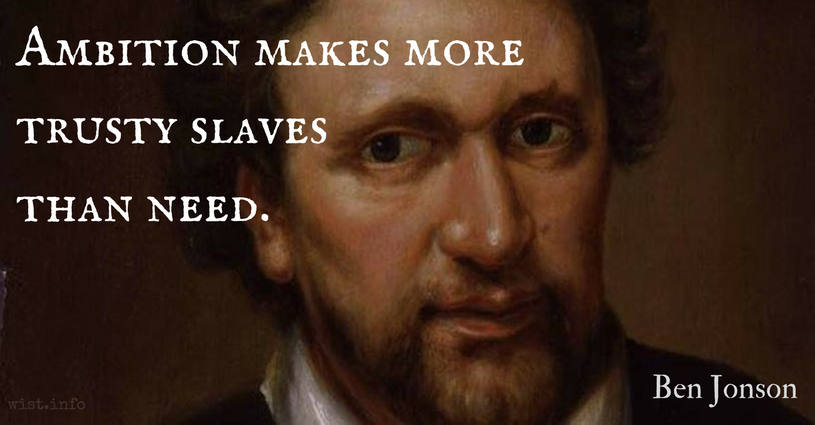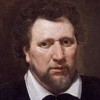Truth ensures trust, but not victory, or even happiness.
Penelope Fitzgerald (1916-2000) Novelist, poet, essayist, biographer
Human Voices, ch. 1 (1980)
(Source)
Writing of BBC News during World War 2.
Quotations about:
trust
Note not all quotations have been tagged, so Search may find additional quotes on this topic.
The Rich knowes not who is his friend.
George Herbert (1593-1633) Welsh priest, orator, poet.
Jacula Prudentum, or Outlandish Proverbs, Sentences, &c. (compiler), # 865 (1640 ed.)
(Source)
Then let no woman hence in man believe,
Or think a lover speaks but to deceive.
He, while ungratified desire is high,
Shrinks from no oath, no promise will deny;
Soon as his lust is satiate with its prize,
He spurns his vows and perjury’s curse defies.
[Nunc iam nulla viro iuranti femina credat,
nulla viri speret sermones esse fideles;
quis dum aliquid cupiens animus praegestit apisci,
nil metuunt iurare, nihil promittere parcunt:
sed simul ac cupidae mentis satiata libido est,
dicta nihil metuere, nihil periuria curant.]Catullus (c. 84 BC – c. 54 BC) Latin poet [Gaius Valerius Catullus]
Carmina # 64 “The Nuptuals of Peleus and Thetis,” ll. 144-149 [tr. Lamb (1821)]
(Source)
Ariadne lamenting Theseus' faithlessness.
(Source (Latin)). Alternate translations:Hear this, and wisdom learn, ye witless fair!
Ne'er let false man with empty oaths deceive,
No protestations of the sex believe!
Is there a wish their ardent souls would gain;
they swear, they promise, and at length obtain;
The wish obtain'd, they fearless break their word,
Nor plighted faith, nor solemn vows regard.
[tr. Nott (1795), # 61; ll. 173ff.]Henceforth let woman; never trust the oaths that man shall make,
Nor ever more his honeyed speech within her bosom take!
While yet the fire of his desire is hot within his breast,
What will he not to woman swear, to heav'n what not protest?
But let her in an evil hour resign her maiden trust,
And yield the blossom of her youth to sate his selfish lust,
Then what recks he of lavish oath, or vow, or whisper'd pray'r?
He triumphs in his perjuries, and spurns at her despair.
[tr. T. Martin (1861)]Henceforth let never woman trust an oath than man shall swear,
Nor count the tender speeches true his lying lips declare:
For when with lusting soul he yearns some object to enjoy,
No oath, no promise then he deems too sacred to employ;
But when his soul is sated, and his burning passion dies,
He fears to break no plighted vows, cares nought for perjuries.
[tr. Cranstoun (1867)]Let not a woman trust, since that first treason, a lover's
Desperate oath, none hope true lover's promise is earnest.
They, while fondly to win their amorous humour essayeth,
Fear no covetous oath, all false free promises heed not;
They if once lewd pleasure attain unruly possession,
Lo they fear not promise, of oath or perjury reck not.
[tr. Ellis (1871)]Now, let woman no more trust her to man when he sweareth,
Ne'er let her hope to find or truth or faith in his pleadings,
Who when lustful thought forelooks to somewhat attaining,
Never an oath they fear, shall spare no promise to promise.
Yet no sooner they sate all lewdness and lecherous fancy,
Nothing remember of words and reck they naught of fore-swearing.
[tr. Burton (1893)]Now, now, let no woman give credence to man's oath, let none hope for faithful vows from mankind; for while their eager desire strives for its end, nothing fear they to swear, nothing of promises forbear they: but instantly their lusting thoughts are satiate with lewdness, nothing of speech they remember, nothing of perjuries care.
[tr. Smithers (1894)]Henceforth let no woman believe a man's oath, let none believe that a man's speeches can be trustworthy. They, while their mind desires something and longs eagerly to gain it, nothing fear to swear, nothing spare to promise; but as soon as the lust of their greedy mind is satisfied, they fear not then their words, they heed not their perjuries.
[tr. Warre Cornish (1904)]Hereafter let; no woman trust man's promises, or hope for faithful words; for when they wish to attain their desires, there is nothing they will not swear, no promise do they scruple to make: but once their desires have been satisfied, they fear no broken words and care nothing for their perjuries.
[tr. Stuttaford (1912)]Never let maid believe a lover's oath;
Nor hope a man be faithful to his troth;
Long as men's hearts are spurred by keen desire,
No oath they shrink from and no promise spare;
Soon as their sated lust begins to tire
No oath they heed and nought for falsehood care.
[tr. Symons-Jeune (1923)]Henceforth, no woman trust the oath of man,
No woman dream the word of man is true:
They, whensoe'er they lust for anything,
Swear every oath and every promise make,
But, when their eager lust is satisfied,
Nor reck of oaths nor promises regard.
[tr. MacNaghten (1925)]Henceforth let never listening maid believe
Protesting man! When their false hearts conceive
The selfish wish, to all but pleasure blind,
No words they spare, no oaths unuttered leave.
But when possession cloys their pampered mind,
No care have they for oaths, no words their honour bind.
[tr. Wright (1926)]From this hour
may no woman believe what men say, for men (minds set upon a single end) will promise everything,
but once the shrewd mind satisfies its passion, it plunges forward (the broken promise merely words that trail behind tall bravery).
[tr. Gregory (1931)]Let no woman ever believe any oath that a man swears,
or ever expect him to keep faith with his fine speeches!
When they want something, when they are anxious to get it,
they take oaths without fear, and pour out promises freely;
but just as soon as their hot desire is sated,
none of their lies & deceptions ever disturb them.
[tr. C. Martin (1979)]From now on let no woman believe a man's sworn promises.
From now on let no woman hope a man's talk is true.
So long as their desiring minds are eager to get something,
they swear to anything. No promise do they spare.
But as soon as the lust in their desirous intent is gratified,
they remember nothing they said, they care nothing for their lies.
[tr. Banks (1997)]Now, no woman should believe a man’s pledges,
or believe there’s any truth in a man’s words:
when their minds are intent on their desire,
they have no fear of oaths, don’t spare their promises:
but as soon as the lust of their eager mind is slaked
they fear no words, they care nothing for perjury.
[tr. Kline (2001)]Henceforth let no woman trust a man's sworn promise,
or hope that he'll ever be true to his given word,
for as long as his lustful heart is bent on possession
he'll shrink from no oath, stop short at no promises,
but the moment hte urge of his ardent mind is sated
he forgets all he's said, breaks oaths without a tremor.
[tr. Green (2005)]Now already let no woman trust a man swearing,
let none hope that the speeches of man are faithful,
for whom while the desiring mind is eager to grasp something,
They fear to swear nothing, they spare to promise nothing.
But as soon as the lust of the desiring mind has been satisfied,
They feared the words as nothing, they care for the false oaths not at all.
[tr. Wikisource (2018)]
We should be more ashamed to distrust our friends than to be deceived by them.
[Il est plus honteux de se défier de ses amis que d’en être trompé.]François VI, duc de La Rochefoucauld (1613-1680) French epigrammatist, memoirist, noble
Réflexions ou sentences et maximes morales [Reflections; or Sentences and Moral Maxims], ¶84 (1665-1678) [tr. Heard (1917)]
(Source)
First appeared in the second (1666) edition. Compare to Maxim 86, also from that edition: "Our distrust justifies the deception of others [Notre défiance justifie la tromperie d’autrui.]"
(Source (French)). Alternate translations:It is much less for a Man's Honour to distrust his Friends, than to be deceived by them.
[tr. Stanhope (1694), ¶85]It is more dishonourable to distrust a friend, than to be deceived by him.
[pub. Donaldson (1783), ¶171; ed. Lepoittevin-Lacroix (1797), ¶81; ed. Carvill (1835), ¶151]It is more disgraceful to distrust; one's friends than to be deceived by them.
[ed. Gowens (1851), ¶87]It is more disgraceful to distrust than to be deceived by our friends.
[tr. Bund/Friswell (1871), ¶84]It is more disgraceful to mistrust one's friends than to be the victim of their treachery.
[tr. Stevens (1939), ¶84]It is more shameful to distrust one's friends than to be deceived by them.
[tr. FitzGibbon (1957), ¶84; tr. Tancock (1959), ¶84]It is more shameful to distrust our friends than to be deceived by them.
[tr. Kronenberger (1959), ¶84; tr. Whichello (2016), ¶84]
That man must be everyone’s personal enemy who has behaved like a public enemy to his own friends. No wise man ever felt that a traitor ought to be trusted.
[Omnium est communis inimicus qui fuit hostis suorum. Nemo umquam sapiens proditori credendum putavit.]
Marcus Tullius Cicero (106-43 BC) Roman orator, statesman, philosopher
In Verrem [Against Verres; Verrine Orations], Action 2, Book 1, ch. 15 / sec. 38 (1.15.38) (70 BC) [tr. Greenwood (1928)]
(Source)
(Source (Latin)). Alternate translations:He is the common enemy of all men who has once been the enemy of his own connections. No wise man ever thought that a traitor was to be trusted
[tr. Yonge (1903)]He is a common enemy who has been a foe to his own people. No man of sense has ever considreed a traitor worthy of credence.
[ed. Harbottle (1906)]
To be trusted is a greater compliment than to be loved.
After a hard night of it two old friends fell into a sleepy conversation in the steam-room of a Turkish bath.
“My wife loves me so much,” said one, “that she’ll believe me when I tell her I was kept downtown all night by business.”
“My wife loves me so much,” said the other, “that I won’t be afraid to tell her the truth.”H. L. Mencken (1880-1956) American writer and journalist [Henry Lewis Mencken]
A Little Book in C Major, ch. 1, § 10 (1916)
(Source)
Sometimes it is good for us to have troubles and hardships, for they often call us back to our own hearts. Once there, we know ourselves to be strangers in this world, and we know that we may not believe in anything that it has to offer.
[Bonum nobis est, quod aliquando habeamus aliquas gravitates et contrarietates, quia sæpe hominem ad cor revocant, quatenus se in exilio esse cognoscat, nec spem suam in aliqua mundi re ponat.]
Thomas à Kempis (c. 1380-1471) German-Dutch priest, author
The Imitation of Christ [De Imitatione Christi], Book 1, ch. 12, v. 1 (1.12.1) (c. 1418-27) [tr. Creasy (1989)]
(Source)
See Psalm 119:71.
(Source (Latin)). Alternate translations:It is good that we have sometime griefs and adversities, for they drive a man to behold himself, and to see that he is here but as in an exile, and be learned thereby to know that he ought not to put his trust in any worldly thing.
[tr. Whitford/Raynal (1530/1871)]It is good that we sometimes have griefs and adversities, for they drive a man to behold himself and to see that he is but here as in exile, and to learn thereby that he ought not put his trust in any worldly thing.
[tr. Whitford/Gardiner (1530/1955)]It is good for us sometimes to suffer affliction and contradiction, because they oftentimes call a man home unto himselfe. They make a man to know that he liveth here but in banishment, and that he must not trust to any thing in this world.
[tr. Page (1639), x.12.1-2]It is good for me that I have been in Trouble, says David. Nor is it David's Case alone, for many Men have reason to bless that Providence which sends Crosses and Calamities upon them. These bring Man's Thoughts home, put him upon Reflection, and help him to understand himself and his Condition. They shew him, that he is in a State of Exile and Pilgrimage, and forbid him to set up his Hope and Rest, in a strange Country, where he is no better than a Sojourner.
[tr. Stanhope (1696; 1706 ed.)]It is good for man to suffer the adversity of this earthly life; for it brings him back to the sacred retirement of the heart, where only he finds, that he is an exile from his native home, and ought not to place his trust in any worldly enjoyment.
[tr. Payne (1803)]It is good that we have sometimes some troubles and crosses; for they often make a man enter into himself, and consider that he is here in banishment, and ought not to place his trust in any worldly thing.
[ed. Parker (1841)]It is good for us that we sometimes suffer contrarieties and vexations; for they call a man back to the retirement of his heart, where only he finds, that, as he is an exile from his native home, he ought not to place his trust in any worldly enjoyment.
[tr. Dibdin (1851)]It is good for us to have sometimes troubles and adversities, for they make a man enter into himself, that he may know that he is in exile, and may not place his hopes in anything of the world.
[ed. Bagster (1860)]It is good for us that we sometimes have sorrows and adversities, for they often make a man lay to heart that he is only a stranger and sojourner, and may not put his trust in any worldly thing.
[tr. Benham (1874)]It is good that we have sometimes troubles and crosses; for they often make a man enter into himself, and consider that he is here in banishment, and ought not to place his trust in any worldly thing.
[tr. Anon. (1901)]It is good for us to have trials and troubles at times, for they often remind us that we are on probation and ought not to hope in any worldly thing.
[tr. Croft/Bolton (1940)]It is good for us at times to have some burdens and adversities, for they often call a man back to his heart, that he may recognise himself to be in exile, and not fix his hope on anything earthly.
[tr. Daplyn (1952)]It is good for us to encounter troubles and adversities from time to time, for trouble often compels a man to search his own heart. It reminds him that he is an exile here, and that he can put his trust in nothing in this world.
[tr. Sherley-Price (1952)]It's good for you to go through difficult times now and again, and to have your will thwarted; the effect is often to make a man think -- make him realize that he is living in exile, and it is no use relying upon any earthly support.
[tr. Knox-Oakley (1959)]It is a good thing that we have to face difficulties and opposition from time to time, because this brings us back to ourselves; it makes us realize that we are exiles and cannot pin our hopes on anything in this world.
[tr. Knott (1962)]It is good for us now and then to experience difficulties and adversity; for they make man realize again that he is an exile and should not put his hopes on any worldly thing.
[tr. Rooney (1979)]
You believe someone not because you have no doubts about them. Belief is not the absence of doubt. You believe someone because you don’t have enough doubts about them.
Malcolm Gladwell (b. 1963) Anglo-Canadian journalist, author, public speaker
Talking to Strangers: What We Should Know About the People We Don’t Know (2019)
(Source)
My parents danced together, her head on his chest. Both had their eyes closed. They seemed so perfectly content. If you can find someone like that, someone who you can hold and close your eyes to the world with, then you’re lucky. Even if it only lasts for a minute or a day. The image of them gently swaying to the music is how I picture love in my mind even after all these years.
Patrick Rothfuss (b. 1973) American author
The Name of the Wind, ch. 15 “Distractions and Farewells” (2007)
(Source)
The truly innosent are thoze who not only are guiltless themselfes, but who think others are.
[The truly innocent are those who not only are guiltless themselves, but who think others are.]
Josh Billings (1818-1885) American humorist, aphorist [pseud. of Henry Wheeler Shaw]
Everybody’s Friend, Or; Josh Billing’s Encyclopedia and Proverbial Philosophy of Wit and Humor, “Plum Pits” (1874)
(Source)
I haven’t a particle of confidence in a man who has no redeeming petty vices whatsoever.
Mark Twain (1835-1910) American writer [pseud. of Samuel Clemens]
“Answers to Correspondents,” The Californian (17 Jun 1865)
(Source)
Reprinted in The Celebrated Jumping Frog of Calaveras County, and Other Sketches (1867).
The principle of Toryism is mistrust of the people, qualified by fear; the principle of Liberalism is trust in the people, qualified by prudence.
William Gladstone (1809-1898) English Liberal politician, Prime Minister (1868-74, 1880-85, 1886, 1892-94)
Inscription on bust, National Liberal Club, London
(Source)
This quotation, or versions of it, are certainly associated to Gladstone, but with enough variants to make concrete attribution difficult. Sometimes given with "Conservatism" substituted for "Toryism." Sometimes quoted in the opposite order. Some renditions use "tempered" rather than "qualified" for one or the other clause, e.g.,:Liberalism is trust of the people, tempered by prudence; Conservatism, distrust of the people, tempered by fear.The principle of Liberalism is trust in the people, qualified by prudence. The principle of Conservatism is mistrust of the people qualified by fear.One party is influenced by trust of the people tempered by prudence, the other by distrust of the people tempered by fear.
The phrase has been attributed to speeches given in Oxford and Chester and in disparate dates from 1866, to 1872, to 1877. It is altogether likely he used different variations at multiple times. Two uses where I could find decent citations:I think that the principle of the Conservative Party is jealousy of liberty and of the people, only qualified by fear; but I think the principle of the Liberal Party is trust in the people, only qualified by prudence.
[Speech, Opening of the Palmerston Club, Oxford (Dec 1878)][His policy of] trust in the people, tempered by prudence, and averse to violent and hasty change.
[Manifesto to the Electors of South-West Lancashire (1866)]
No trust is safe.
[Nusquam tuta fides.]
Virgil (70-19 BC) Roman poet [b. Publius Vergilius Maro; also Vergil]
The Aeneid [Ænē̆is], Book 4, l. 373 (4.373) [Dido] (29-19 BC) [tr. Bartsch (2021)]
(Source)
Dido chiding Aeneas (and the gods) for Aeneas' desertion.
(Source (Latin)). Alternate translations:True faith is lost.
[tr. Ogilby (1649)]Faithless is earth, and faithless are the skies!
Justice is fled, and Truth is now no more!
[tr. Dryden (1697)]Firm faith no where subsists.
[tr. Davidson/Buckley (1854)]No faith on earth, in heaven no trust.
[tr. Conington (1866)]Faith lives no more.
[tr. Cranch (1872)]Nowhere is trust safe.
[tr. Mackail (1885)]All faith is gone!
[tr. Morris (1900)]Faithless is earth, and false is Heaven above.
[tr. Taylor (1907), st. 48, l. 426]No trusting heart is safe
in all this world.
[tr. Williams (1910)]Nowhere is faith secure.
[tr. Fairclough (1916)]Faith has no haven anywhere in the world.
[tr. Humphries (1951)]Nowhere is it safe to be trustful.
[tr. Day Lewis (1952)]Nowhere is certain trust.
[tr. Mandelbaum (1971), l. 509]Faith can never be secure.
[tr. Fitzgerald (1981), l. 514]Is there nothing we can trust in this life?
[tr. West (1990)]Nowhere is truth safe.
[tr. Kline (2002)]Good faith is found nowhere.
[tr. Lombardo (2005)]There’s no faith left on earth!
[tr. Fagles (2006)]
In all such oaths we are not to attend to the mere form of words, but the true design and intention of them.
[Semper autem in fide quid senseris, non quid dixeris, cogitandum.]
Marcus Tullius Cicero (106-43 BC) Roman orator, statesman, philosopher
De Officiis [On Duties; On Moral Duty; The Offices], Book 1, ch. 13 (1.13) / sec. 40 (44 BC) [tr. Cockman (1699)]
(Source)
(Source (Latin)). Alternate translations:In obligations of faith, it is the meaning always, not the words that are to be considered.
[tr. McCartney (1798)]In a promise, what you thought, and not what you said, is always to be considered.
[tr. Edmonds (1865)]In a promise, what you mean, not what you say, is always to be taken into account.
[tr. Peabody (1883)]A promise must be kept not merely in the letter, but in the spirit.
[ed. Harbottle (1906)]In the matter of a promise one must always consider the meaning and not the mere words.
[tr. Miller (1913)]You should always, in a matter of trust, think of what you mean, not of what you say.
[tr. Edinger (1974)]
That’s life: Trust and you’re betrayed; don’t trust and you betray yourself.
“I am going to tell you something Benedict should have told you long ago,” I said. “Never trust a relative. It is far worse than trusting strangers. With a stranger there is a possibility that you might be safe.”
“You really mean that, don’t you?”
“Yes.”
“Yourself included?”
I smiled. “Of course it does not apply to me. I am the soul of honor, kindness, mercy, and goodness. Trust me in all things.”
The truly innosent are thoze who not only are guiltless themselfes, but who think others are.
[The truly innocent are those who not only are guiltless themselves, but who think others are.]
Josh Billings (1818-1885) American humorist, aphorist [pseud. of Henry Wheeler Shaw]
Everybody’s Friend, Or; Josh Billing’s Encyclopedia and Proverbial Philosophy of Wit and Humor, “Plum Pits” (1874)
(Source)
Agatha looked up. “I guess. I just wonder how many other girls have to worry about whether or not it’s smart to really trust their … you know, the guys they –”
Lady Vitriox crossed her arms. “All of them,” she said flatly.
“But mine has an army!”
The old woman shook her head. “They all do, my Lady. It consists of other men.”
Phil Foglio (b. 1956) American writer, cartoonist
Agatha H. and the Siege of Mechanicsburg (2020) [with Kaja Foglio]
(Source)
Civility is not a tactic or a sentiment. It is the determined choice of trust over cynicism, of community over chaos.
“When it comes to strangers with guns,” I told her, “I think suspicion is more likely to keep you alive than trust.”
Women just can’t be trusted any more.
[Ἐπεὶ οὐκέτι πιστὰ γυναιξίν.]
Homer (fl. 7th-8th C. BC) Greek author
The Odyssey [Ὀδύσσεια], Book 11, l. 456 (11.456) [Agamemnon] (c. 700 BC) [tr. Lombardo (2000), l. 274]
(Source)
Agamemnon, who was slain on his homecoming by Clytemnestra, is giving Odysseus marital advice when the latter visits Hades. Original Greek. Alternate translations:
- "For ’tis no world to trust a woman now." [tr. Chapman (1616)]
- "Remember still, women unfaithful are." [tr. Hobbes (1675)]
- "For since of womankind so few are just, / Think all are false, nor even the faithful trust." [tr. Pope (1725)]
- "For woman merits trust no more." [tr. Cowper (1792), l. 453]
- "No more are women to be trusted now." [tr. Worsley (1861), st. 54]
- "For that trust / Henceforth in women must never be plac'd." [tr. Musgrave (1869), l. 706ff]
- "No trust in women!" [tr. Bigge-Wither (1869), l. 455]
- "For there is no more faith in woman." [tr. Butcher/Lang (1879) and Palmer (1891)]
- "From now henceforth in women no troth or trust shall be." [tr. Morris (1887)]
- "For after all this there is no trusting women." [tr. Butler (1898)]
- "For no longer is there faith in women." [tr. Murray (1919)]
- "There is no putting faith in women." [tr. Lawrence (1932)]
- "Women, I tell you, are no longer to be trusted." [tr. Rieu (1946) and DCH Rieu (2002)]
- "There is no trusting in women." [tr. Lattimore (1965)]
- "No woman merits trust." [tr. Mandelbaum (1990)]
- "The time for trusting women's gone forever!" [tr. Fagles (1996), l. 456]
- "Women are no longer to be trusted." [tr. Verity (2016)]
- "No more is there faith in women." [tr. Green (2018)]
- "For there’s no trust / in women anymore." [tr. Johnston (2019), l. 577ff]
We are all born brave, trusting and greedy, and most of us manage to remain greedy.
Mignon McLaughlin (1913-1983) American journalist and author
The Second Neurotic’s Notebook, ch. 9 (1966)
(Source)
POGO: I figgers, Porky, that every man’s heart is eventual in the right place.
PORKY PINE: An’ I figgers, Pogo, that if a man’s gonna be wrong ’bout somethin’, that is the best wrong thing to keep bein’ wrong about til forever.
Walt Kelly (1913-1973) American animator and cartoonist [Walter Crawford Kelly, Jr.]
The Incompleat Pogo, ch. 20 “A Tiger Burns Bright” (1953)
(Source)
Many sources paraphrase this as:POGO: Eventual Porky, I figger ev'ry critter's heart's in the right place.
PORKY PINE: If you gotta be wrong 'bout somthin', that's 'bout the best thing they is to be wrong 'bout.
His philosophy was a mixture of three famous schools — the Cynics, the Stoics and the Epicureans — and summed up all three of them in his famous phrase, “You can’t trust any bugger further than you can throw him, and there’s nothing you can do about it, so let’s have a drink.”
In God we trust. All others must bring data.
W. Edwards Deming (1900-1993) American management consultant, educator
(Misattributed)
Variants: "All others must have/provide data."
Frequently attributed to Deming, probably through Mary Walton, The Deming Management Method, ch. 20 (1986), though it is presented there without attribution: "'In God we trust. All others must bring data.' If there is a credo for statisticians, it is that."
The earliest appearance in print comes from Edwin R. Fisher, Effect of Smoking on Nonsmokers: Hearing Before the Subcommittee on Tobacco of the Committee on Agriculture, House of Representatives, Ninety-fifth Congress, Second Session (7 Sep 1978): "I should like to close by citing a well-recognized cliche in scientific circles. The cliche is, 'In God we trust, others must provide data.'"
For more discussion see here.
It is not the idea as such which the censor attacks, whether it be heresy or radicalism or obscenity. He attacks the circulation of the idea among the classes which in his judgment are not to be trusted with the idea.
Walter Lippmann (1889-1974) American journalist and author
Men of Destiny, ch. 8 “The Nature of the Battle Over Censorship,” sec. 2 (1927)
(Source)
The only man for whom Hitler had “unqualified respect” was “Stalin the genius,” and while in the case of Stalin and the Russian regime we do not have (and presumably never will have) the rich documentary material that is available for Germany, we nevertheless know since Khrushchev’s speech before the Twentieth Party Congress that Stalin trusted only one man and that was Hitler.
Hannah Arendt (1906-1975) German-American philosopher, political theorist
The Origins of Totalitarianism, Part 3, ch. 10 “A Classless Society,” sec. 1 (1951)
(Source)
There is no fellowship inviolate,
no faith is kept, when kingship is concerned.[Nulla sancta societas
Nec fides regni est.]Ennius (239-169 BC) Roman poet, writer [Quintus Ennius]
Fragment 402-3 [tr. Miller]
(Source)
Quoted in Cicero, De Officiis, Book 1, ch. 8, sec. 26 (scaen. 404 Vahlen), speaking of Julius Caesar.
Alt. trans.:
- "To kingship belongs neither sacred fellowship nor faith."
- "No society is sacred, nor faith of empire." [tr. Johnson (1828)]
- "There is no holy bond, and no fidelity / 'Twixt those who share a throne." [Source]
- "Where the throne's shared, there cannot be good faith." [Source]
“Praying for particular things,” said I, “always seems to me like advising God how to run the world. Wouldn’t it be wiser to assume that He knows best?”
“On the same principle,” said he, “I suppose you never ask a man next to you to pass the salt, because God knows best whether you ought to have salt or not. And I suppose you never take an umbrella, because God knows best whether you ought to be wet or dry.”
“That’s quite different,” I protested.
“I don’t see why,” said he. “The odd thing is that He should let us influence the course of events at all. But since He lets us do it in one way, I don’t see why He shouldn’t let us do it in the other.”
C. S. Lewis (1898-1963) English writer, literary scholar, lay theologian [Clive Staples Lewis]
God in the Dock, Part 2, ch. 7 “Scraps,” #4 (1970)
(Source)
Because a body of men holding themselves accountable to nobody, ought not to be trusted by anybody.
Thomas Paine (1737-1809) American political philosopher and writer
The Rights of Man (1791)
(Source)
Ambition makes more trusty slaves than need.
Phryne Fisher had a taste for young and comely men, but she was not prone to trust them with anything but her body.
Every civilization rests on a set of promises: moral promises about how to behave toward each other, physical promises about how to use our economic system. If the promises are broken too often, the civilization dies, no matter how rich it may be, or how mechanically clever. Hope and faith depend upon promises; if hope and faith go, everything goes.
All men profess honesty as long as they can. To believe all men honest would be folly. To believe none so is something worse.
John Quincy Adams (1767-1848) US President (1825-29)
Letter to William Eustis (22 Jun 1809)
(Source)
Every boddy in this world wants watching, but none more than ourselves.
[Everybody in this world wants watching, but none more than ourselves.]
Josh Billings (1818-1885) American humorist, aphorist [pseud. of Henry Wheeler Shaw]
Everybody’s Friend, Or; Josh Billing’s Encyclopedia and Proverbial Philosophy of Wit and Humor, ch. 142 “Affurisms: Fust Impreshuns” (1874)
(Source)
You must look into people, as well as at them. Almost all people are born with all the passions, to a certain degree; but almost every man has one prevailing one, to which the others are subordinate. Search every one for that ruling passion; pry into the recesses of his heart, and observe the different workings of the same passion in different people; and when you have found out the prevailing passion of any man, remember never to trust him where that passion is concerned. Work upon him by it, if you please; but be upon your guard yourself against it, whatever professions he may make you.
Lord Chesterfield (1694-1773) English statesman, wit [Philip Dormer Stanhope]
Letter to his son, #112 (4 Oct 1746)
(Source)
Distrust and caution are the parents of security.
Benjamin Franklin (1706-1790) American statesman, scientist, philosopher, aphorist
Poor Richard (1733)
(Source)
Riches are a trust. … Power is a trust. So also is genius or every degree of wisdom. … Talents are a trust, too; that is the condition of their increase. They must be put out to use, or they will ruin the steward.
Remember, though we struggle against things because we are afraid of them, it is often the other way round — we get afraid because we struggle. Are you struggling, resisting? Don’t you think Our Lord says to you ‘Peace, child, peace. Relax. Let go. Underneath are the everlasting arms. Let go, I will catch you. Do you trust me so little?’ Of course, this may not be the end. Then make it a good rehearsal.
Trust no friend without faults,
And love a maiden, but no angel.[Trau keinem Freunde sonder Mängel,
Und leib’ ein Mädchen, kienem Engel.]
COUNTESS: Love all, trust a few,
Do wrong to none.William Shakespeare (1564-1616) English dramatist and poet
All’s Well That Ends Well, Act 1, sc. 1, l. 66ff (1.1.66-67)(1602?)
(Source)
If you can trust yourself when all men doubt you,
But make allowance for their doubting, too ….
Any man who attains a high place among you, from the President downwards, may date his downfall from that moment; for any printed lie that any notorious villain pens, although it militate directly against the character and conduct of a life, appeals at once to your distrust, and is believed. You will strain at a gnat in the way of trustfulness and confidence, however fairly won and well deserved; but you will swallow a whole caravan of camels, if they be laden with unworthy doubts and mean suspicions. Is this well, think you, or likely to elevate the character of the governors or the governed among you?
Those who retire from the world on akount ov its sin and peskyness must not forgit that they hav got tew keep kompany with a person who wants just as much watching as ennyboddy else.
[Those who retire from the world on account of its sin and peskiness must not forget that they have got to keep company with a person who wants just as much watching as anybody else.]
A person who is never duped cannot be a friend.
[Qui n’est jamais dupe n’est pas ami.]
Joseph Joubert (1754-1824) French moralist, philosopher, essayist, poet
Pensées [Thoughts], ch. 5 “Des Passions et des Affections de l’Âme [On the Soul],” ¶ 36 (1850 ed.) [tr. Auster (1983)], 1805 entry]
(Source)
(Source (French)). Alternate translations:He cannot be a friend who is never a dupe.
[tr. Lyttelton (1899), ch. 4, ¶ 26]
Trusting to luck is only another name for trusting to lazyness.
Josh Billings (1818-1885) American humorist, aphorist [pseud. of Henry Wheeler Shaw]
Everybody’s Friend, Or; Josh Billing’s Encyclopedia and Proverbial Philosophy of Wit and Humor, ch. 131 “Affurisms: Plum Pits (1)” (1874)
(Source)
Man cannot live without a permanent trust in something indestructible in himself, though both the indestructible element and the trust may remain permanently hidden from him. One of the ways in which this hiddenness can express itself is through faith in a personal god.
[Der Mensch kann nicht leben ohne ein dauerndes Vertrauen zu etwas Unzerstörbarem in sich, wobei sowohl das Unzerstörbare als auch das Vertrauen ihm dauernd verborgen bleiben können. Eine der Ausdrucksmöglichkeiten dieses Verborgen-Bleibens ist der Glaube an einen persönlichen Gott.]
Alt. trans.:
- “Man cannot live without an enduring faith in something indestructible within him.” [In Max Brod, introduction to Gustav Janouch, Conversations with Kafka (1953) [tr. Rees]]
- “Man cannot live long without a steady faith in something indestructible within him, though both faith and the indestructible thing may remain permanently concealed from him.”
Franz Kafka (1883-1924) Czech-Austrian Jewish writer
Notebook, Aphorism # 50 [tr. Kaiser and Wilkins]
Alt. trans.:
- "Man cannot live without an enduring faith in something indestructible within him." [In Max Brod, introduction to Gustav Janouch, Conversations with Kafka (1953) [tr. Rees]]
- "Man cannot live long without a steady faith in something indestructible within him, though both faith and the indestructible thing may remain permanently concealed from him."
Trust him no further than you can throw him.
Thomas Fuller (1654-1734) English physician, preacher, aphorist, writer
Gnomologia: Adages and Proverbs, #5286 (1732)
(Source)
A state that denies its citizens their basic rights becomes a danger to its neighbors as well: internal arbitrary rule will be reflected in arbitrary external relations. The suppression of public opinion, the abolition of public competition for power and its public exercise opens the way for the state power to arm itself in any way it sees fit. A manipulated population can be misused in serving any military adventure whatever. Unreliability in some areas arouses justifiable fear of unreliability in everything. A state that does not hesitate to lie to its own people will not hesitate to lie to other states.
Václav Havel (1936-2011) Czech playwright, essayist, dissident, politician
“An Anatomy of Reticence [Anatomie jedné zdrženlivosti],” sec. 9, no. 5 (1985-04) [tr. Kohák (1986)]
(Source)
First reprinted in Cross Currents: A Yearbook of Central European Culture #5 (1986). Reprinted here in Living in Truth: twenty-two essays published on the occasion of the award of the Erasmus Prize to Václav Havel, Part 1, ch. 6 (1986).
He that’s cheated twice by the same Man is an Accomplice with the Cheater.
Thomas Fuller (1654-1734) English physician, preacher, aphorist, writer
Gnomologia: Adages and Proverbs, #2281 (1732)
(Source)
it would be a dangerous delusion were a confidence in the men of our choice to silence our fears for the safety of our rights; that confidence is every where the parent of despotism; free government is founded in jealousy, and not in confidence; it is jealousy, and not confidence, which prescribes limited constitutions to bind down those whom we are obliged to trust with power; that our Constitution has accordingly fixed the limits to which, and no farther, our confidence may go. […] In questions of power, then, let no more be said of confidence in man, but bind him down from mischief by the chains of the Constitution.
Thomas Jefferson (1743-1826) American political philosopher, polymath, statesman, US President (1801-09)
“Kentucky Resolutions,” Resolution 9 (1798)
(Source)
In protest of the Alien and Sedition Acts.
There is nothing anti-intellectual in the leap of faith, for faith is not believing without proof but trusting without reservation.
William Sloane Coffin, Jr. (1924-2006) American minister, social activist
Credo, “Faith, Hope, Love” (2004)
(Source)
The glory of friendship is not the outstretched hand, nor the kindly smile nor the joy of companionship; it is the spiritual inspiration that comes to one when he discovers that someone else believes in him and is willing to trust him with his friendship.
We are inclined to believe those whom we do not know because they have never decieved us.
Samuel Johnson (1709-1784) English writer, lexicographer, critic
The Idler, #80 (27 Oct 1759)
(Source)
The vanity of being trusted with a secret is generally one of the chief motives to disclose it; for however absurd it may be thought to boast an honor by an act with shows that it was conferred without merit, yet most men seem rather inclined to confess the want of virtue than of importance, and more willingly show their influence, though at the expense of their probity, than glide through life with no other pleasure than the private consciousness of fidelity; which, while it is preserved, must be without praise, except from the single person who tries and knows it.
Samuel Johnson (1709-1784) English writer, lexicographer, critic
The Rambler, #13 (1 May 1750)
(Source)
When a man assumes a public trust, he should consider himself as public property, and justly liable to the inspection and vigilance of public opinion; and the more sensibly he is made to feel his dependence, the less danger will there be of his abuse of power.
Thomas Jefferson (1743-1826) American political philosopher, polymath, statesman, US President (1801-09)
Conversation with Baron Humboldt (1807)
(Source)
In Seymour, A Winter in Washingtonm ch. 9 (1824), further identified in Raynor, Life of Jefferson (1832). As it is all anecdotal, the accuracy may be easily questioned, but its proximity to the events lends it a certain validity.







